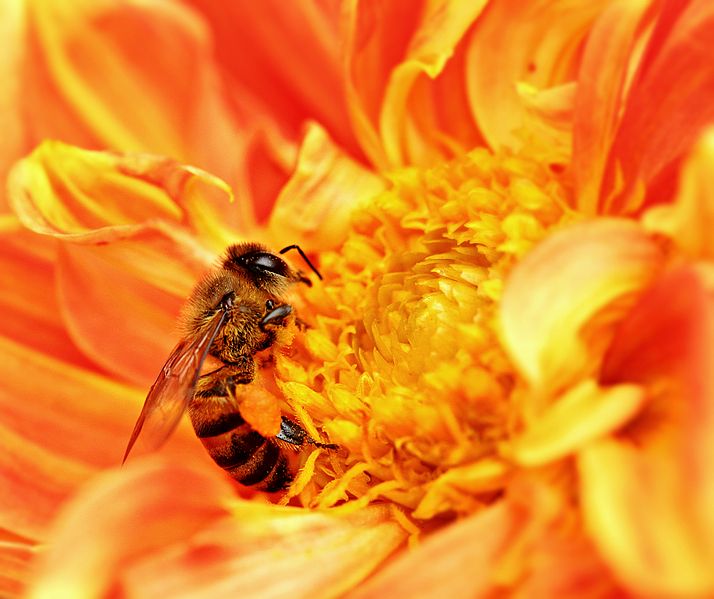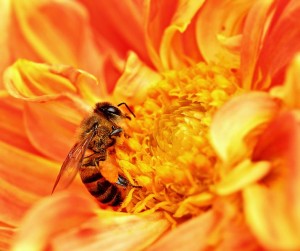Because my research often uses bees as the study subject, friends and family are always forwarding links to news and culture that concerns these fascinating creatures. Let me list for you some of my favourites: I found this article about the debate surrounding the ban on neonicotinoids within the EU on twitter. On a lighter note, a performance group teamed up with a group of monks at Glenstal Abbey to compose a “Song of the bees” based on scientific recordings and data from honeybees. A friend on facebook sent me this comic, which describes the seeming absurdity of honeybee workers sacrificing themselves for their hives. Another facebook find was this spoof article which points out that we could probably solve the problem of bee decline if bees privatised. Finally, friends and family in Philadelphia informed me that Drexel University recently named its new department the BEES department! That last one is a little deceiving because BEES stands for Department of Biodiversity, Earth and Environmental Science, so they don’t actually focus on the study of bees. I think it’s still significant that the department’s acronym features our little buzzing friends though. In addition to these references, the birthday and Christmas gifts I’ve received over the past three years include bee embroidered hand towels, wine glasses with bees painted on them, a bracelet with a bee charm, and a stuffed bee .
What is apparent from all of these links and articles (and the availability of the plethora of bee paraphernalia my lovely friends and family continue to buy for me), is that bees are incredibly popular right now. And I can’t help but ask myself, what is the attraction?
My first question was am I just noticing these references more because I started studying bees in the last few years? Honestly if you asked me to point out the difference between a honeybee and a bumblebee before I went to college, I’m sure I wouldn’t have been able to do it. But it turns out it’s not personal bias, not according to the scientific literature anyway. The graph below is the result of a search in Web of Science for papers that contain the word “bee” or “bees” in the topic. Clearly there has been increased interest in bees since the 1940’s. In the last few years the publications on bees have been especially numerous, for example there were 1796 records in 2012.
Okay, so bees are being studied more. But why does the public seem to be so intrigued by these organisms? Why do people love bees?
I have a few thoughts- I’ll start with the obvious:
1.) Bees make honey.
Or so many think. In reality, not all bees make honey. The honey-like substance that bumblebees produce would not be fit for consumption- they don’t keep their colonies nice and neat like honeybees do, so you’d be likely to get a mouth full of bacteria or bee larvae in your honey if it came from a bumblebee. But everyone thinks all bees make honey, and after all, honey is delicious.
2.) The social nature of bees.
The average person may not know much about solitary bees or the differences in the life cycles of bee species, but usually they can tell you that honeybees have a queen. People also commonly know that the queen bee is responsible for producing all the rest of the bees, and that the rest of the bees in the colony will fight to the death to protect her. I’m not trying to dive too deeply into psychology here, but I think that the apparent altruism of bees attracts people to them and makes them a more sympathetic organism than we would normally consider something with a sting. People also like the concept of a “superorganism.”
3.) The “busy bee”
If you’ve ever watched a bee in the springtime foraging on a flower it’s clear that they are working hard. The work ethic of bees is impressive! I think people like that bees put in a hard day’s work, collecting food for themselves and their brood. It makes us think kindly of them, the working class insect.
4.) The ecosystem service
Maybe my first three reasons seem a bit silly and have left you unconvinced, so I will end with a more scientific explanation. We’ve known for some time that bees make excellent pollinators, and pollination is an important ecosystem service. In 2006 Science published two studies describing declines in pollinators in Europe and North America. These findings were compounded by the emergence of colony collapse disorder just a year or so later, leading to intense fear that our helpful honeybees were experiencing declines in population that they simply wouldn’t be able to recover from. The next question was what will be the impact of declining bee populations on food security? Turns out it’s rather significant. Studies have shown that the global economic value of pollination is over €153 billion. Furthermore, a study in March demonstrated that honeybees cannot replace the value of pollination services from wild pollinators; we can’t just worry about the honeybees, wild bees are important to increasing yields as well. Food security is not something we tend to take lightly, so our pollinators have intrinsic value. This helps explain the incredible media coverage bees have been receiving lately, especially regarding the European ban of neonicotinoids, a class of insecticides that have been shown to be harmful to bees.
I wonder though, how many people know the facts about how important bees are to the ecosystem service of pollination and therefore food security? How many people really like them because they are fuzzy, make sweet honey, and are hard workers? I suppose you could argue that it doesn’t matter why people are attracted to bees, it’s positive regardless because it encourages money to be spent on research into why they are declining and how we can conserve their populations. I think it’s helpful to try to understand why bees have become a sort of flagship species. That way we can better understand what traits cause humans to assign intrinsic value to organisms for future conservation work.
Author
Erin Jo Tiedeken: tiedekee[at]tcd.ie
Photo credit
wikimedia commons




One Reply to “The popularity of bees”